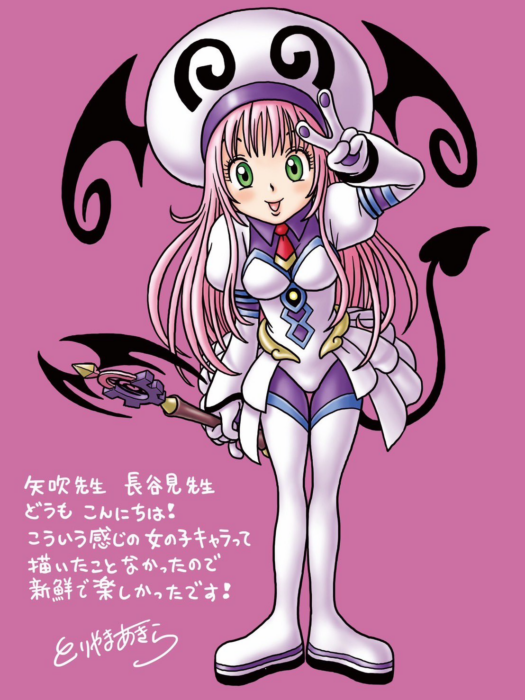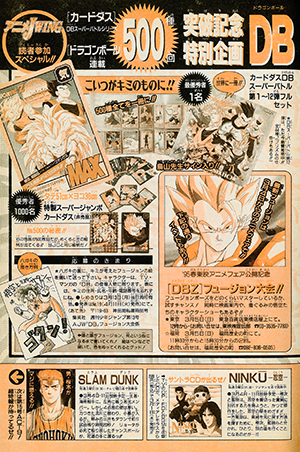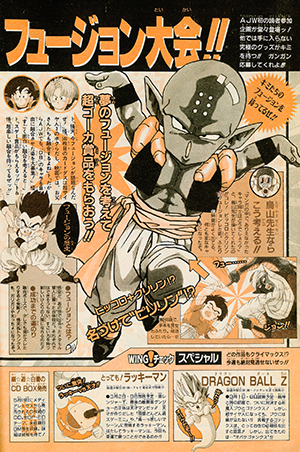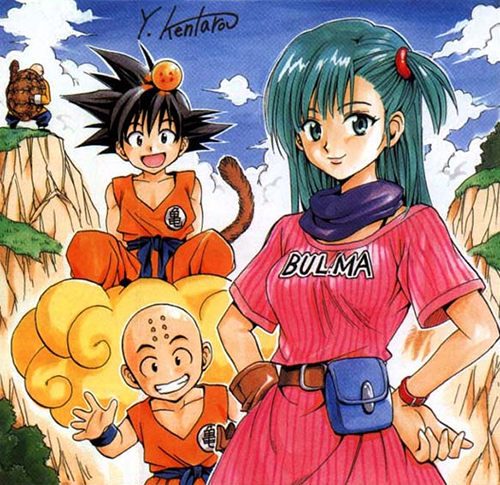Kentarō Yabuki — now a modern mangaka legend in his own right — took to Twitter to reflect on the passing of Akira Toriyama, and in the process shared his original design for “Gohanks”: a fan contest submission that was later reimagined into a “real” character.
Yabuki initially shared:
This is going to be a bit long, but just for the sake of sorting out my feelings, allow me to write down some personal thoughts.
Back when I was a young boy, I used to change schools a lot, and so, being by myself was a common occurrence, but by using Dragon Ball as a talking point, I was able to make new friends wherever I went.
I copied a lot of Toriyama-sensei‘s illustrations, and through that, I was able to discover the enjoyment of drawing comics. I was also super addicted to both Dragon Quest and Chrono Trigger.
The first time a picture of mine was ever published in Jump was with a fan-made character that I had mailed in by postcard. I think that became my source of confidence to, several years later, send a submission to a manga contest.
I was never blessed with the chance to meet him, but even if I had, I think I would have been so awestruck that I wouldn’t have been able to even approach him. That’s how much I admired him.
The picture I received from him for To Love-Ru‘s 10th Anniversary also came bundled with a comment that was filled with so much kindness that I will treasure it for the rest of my life.
Toriyama-sensei, I truly thank you for giving me… no, for giving all of us fun memories throughout all of our lives.
I pray that I might one day meet you, clad with a halo on top of your head.
From the bottom of my heart, I pray that your soul may rest in peace.
The image in question for To Love-Ru‘s 10th anniversary does indeed include a message from Toriyama, which states:
Yabuki-sensei, Hasemi-sensei,
Good afternoon! I have never drawn a young girl character that had this kind of feel to it, so this was a pretty fresh and fun experience!
– Akira Toriyama
Beyond the celebratory image from Toriyama, however, Yabuki refers here to his submission to a bona fide contest that Shueisha held, announced in the 1995 No. 13 issue of Weekly Shōnen Jump (published 28 February 1995 in Japan alongside chapter 508 of the original Dragon Ball manga): their first-ever reader-participation project soliciting fan designs for new fusions, with the potential to win a 500-card Carddass Dragon Ball Super Battle Series set and an autograph from Akira Toriyama himself! The original contest announcement is notable for its design concept from Toriyama: a fusion of Piccolo and Kuririn named “Piririn”.
After receiving 12,792 (!!!) entries, Shueisha was ready to reveal the winner(s). The Anime J-Wing column on pages 34-35 in the 1995 No. 19 issue of Weekly Shōnen Jump (published 11 April 1995 alongside chapter 514 of the original manga) showcased the grand-prize winner along with seven runners-up, each receiving their own specially-named prize title. In choosing the winners, the editorial team looked at both the combinations and the quality of the illustrations.
The “Cool Prize” [Kakko ii de Shō] was awarded to “Gohanks” (ゴハンクス Gohankusu) — a fusion of Son Gohan and the teenage Trunks — by Kentarō Yabuki (age 15) of Okayama prefecture:
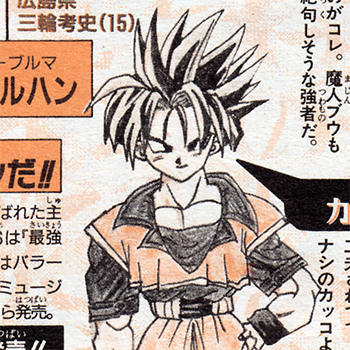
[caption] GOTENKS: “Whoa! I wanna fight him!”
Although it’s Gohan and Trunks, the use of teenage Trunks in this one caught our eye. The costume, a fusion of both of their outfits, is also well-thought out. We have no complaints about his coolness!!
The same Kentarō Yabuki that won the fusion contest “Cool Prize” in 1995 at the young age of 15 would go on to publish manga in the same pages of Jump as his childhood idol, Akira Toriyama. Following his professional debut a few years earlier, Yabuki hit it big in 2000 with the series Black Cat (which ran until 2004 and received a television series adaptation). Yabuki continues working in manga illustration to this day, from 2006’s To Love-Ru, to the manga adaptation of the 2018 animated series Darling in the Franxx, to Ayakashi Triangle in 2020.
Over the course of 2002-2004, Shueisha released the kanzenban edition of the Dragon Ball manga: a larger-format print of the series on higher-quality paper, packing more chapters per volume resulting in a 34-volume run (down from the original 42), and with new cover artwork from Akira Toriyama. Every-other volume also came packed with a special pamphlet promoting various Shueisha series and products, as well as an original illustration from a popular Jump artist expressing their love for Dragon Ball. For the seventh volume in June 2003, Yabuki was selected to provide this illustration and comment:
“Do you remember me?”
“Of course I remember you! You’re Vegeta-Yabuki!!”That was a conversation in my third year of junior high, between me and an elementary-school friend I hadn’t heard from in a few years. During elementary school and junior high, I changed schools three times due to my parents’ work, from Okayama to Kōchi, from there to Kita-Kyūshū, and then back to Okayama. He was a friend from when I was in Kōchi, and for whatever reason, his strongest impression of me was apparently that I was good at drawing Vegeta.
Ever since I was in elementary school, if I had free time, I’d spend it doing nothing but drawing. And, the things I’d draw would always be Goku, or Vegeta, or Freeza… Characters from Dragon Ball, which I loved. Once I was able to draw characters off the top of my head to an extent, I’d then draw an original Tenka’ichi Budōkai manga, and make Goku fight against a character of my own design. And, the winner would always be Goku. Come to think of it, everything I learned about how to draw manga, from the expressive techniques, to dividing up the panels, I learned from Dragon Ball. If not for Dragon Ball, I might never have wanted to become a manga artist. More than anything, Dragon Ball taught me “the joy of drawing manga”.
Speaking of which, my debut in Jump wasn’t with my own manga, but with Dragon Ball. Around the end of my third year in junior high, there was a “Fusion Contest” promotion in Jump, where you had to create an original character by making any two characters from Dragon Ball do Fusion. I fused together my favorite characters at the time, teenage Gohan and teenage Trunks, to create a character called “Gohanks”; I drew an illustration and sent it in. Then, I got an award called the “Cool Prize” (heh), and it ran, relatively large, in the color pages of Jump. That experience really moved me.
It’s been about eight years since then, but even now, where I work, I still have a bunch of figures of Goku and company that I collected back then on display. When I get tired from drawing my own manga, I’ll draw things like Cell and Freeza in Toriyama-style in the margins of my notebook. Doing that, I feel strangely excited, and I get more energy. Nothing has changed since elementary school. I believe I’ll keep on drawing manga.
This brings us to present day, with Yabuki continuing to reflect on the work of Toriyama. In a follow-up post on Twitter, Yabuki shared additional thoughts… as well as his original contest ideas:
Back in middle school, I submitted a postcard for the Dragon Ball Fusion Contest. You can certainly tell a lot from the ideas that I ultimately decided not to send out, but I will submit myself to public humiliation so that you can all laugh a bit at my expense.
I completely forgot that this embarrassing thing – which, somehow, does not have a single crease on it, even after 30 years – was not at my parents’ house, but actually in the archive at my own place.
At first I thought about submitting “Kameseroli.” but since Broli was a movie-only character, I gave up on it.
And given that Boo’s dog has since been named “Bee,” I would maybe rename him “Beoo” instead of “Boonu.”
Gohanks — though not exactly as originally designed by Yabuki — made a surprise appearance many years later.
The March 2016 issue of Shueisha’s V-Jump magazine revealed a new video game in development: code-named “Project Fusion” and developed by Ganbarion, the game would see different islands and cities merging together. The game — later revealed to be named Dragon Ball Fusions — included several references to the 1995 contest, including Piririn. Additionally, though not with his original design, a certain fusion would return twice over: as a cross-promotion for both Dragon Ball Fusions as well as the card-based arcade game Dragon Ball Heroes, the July 2016 issue of Shueisha’s V-Jump magazine introduced two new versions of “Gohanks”:
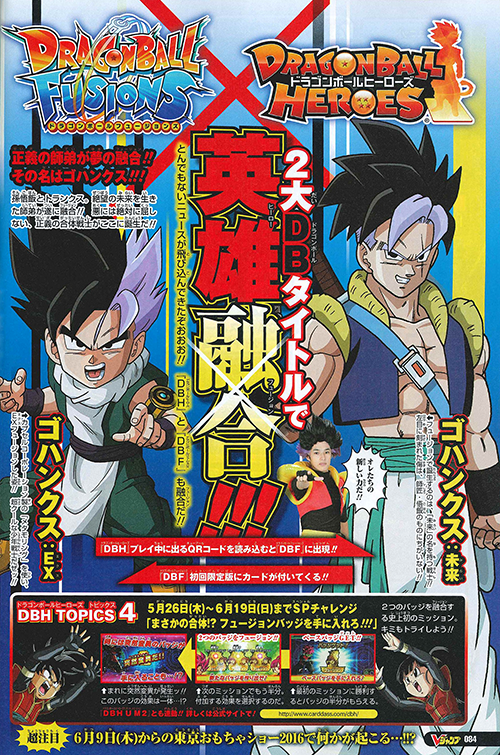
Learn more about the new versions of Gohanks — as well as a wealth of other fan fusion designs from the original 1995 contest and beyond — in our “Official Fan Fusion Designs: Part 1 (1995)” article!
